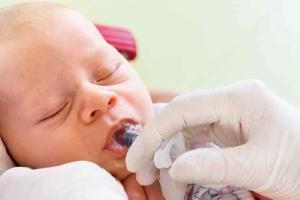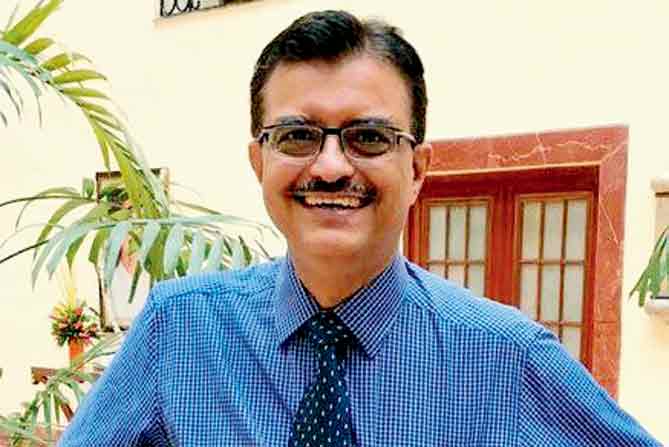
Pic for representation/istock
The COVID-19 pandemic and the subsequent lockdown has impacted the vaccination process for newborn babies and infants, exposing them to life-threatening diseases like polio, measles, German measles, whooping cough, diphtheria etc, which has become a matter of concern for healthcare experts. They believe that the need of the hour is to start the immunisation process.
ADVERTISEMENT
'Process should start'
Speaking to mid-day, Dr Fazal Nabi, director of paediatric department, Jaslok hospital, said, "We cannot miss out on the immunisation process for a long time, especially when it comes to the gap between two primary dosages. This will only compromise the immunity response to any infection that the baby may be exposed to."
"The BMC must now make arrangements to set up vaccination centres for infants and newborns at primary healthcare units and dispensaries," he added. Dr Nabi said that further delay in starting the process might turn it into a bigger challenge than COVID-19.
Dr Wiqar Shaikh, senior allergy and asthma specialist, said, "Approximately 26 million children are born in India every year, and without vaccination, they are susceptible to life-threatening diseases. The pandemic has affected India's healthcare services, and Asha workers and community health workers, who once used to work for the immunisation process, are now focused on COVID-19 containment. This will lead to an unacceptable drop in the percentage of immunised children, and may trigger an outbreak of diseases, which could be more dangerous than COVID-19."
He added, "A study conducted by WHO on 129 countries has revealed that the disruption of the vaccination process will put 80 million new born babies at risk of getting communicable diseases. Over 117 million children (1 to 10 years) in 13 countries are expected to miss out on life-saving vaccines, particularly the one for measles. The need of the hour is to start house-to-house surveys and provide the required vaccines to the children at the earliest."
Mandatory vaccines
Dr Deepti Dongaonkar, former dean of Nagpur, Latur and Miraj government medical colleges, said, "These vaccines are mandatory for children and they need to be taken since the time of birth at intervals of six weeks, 10 weeks, 14 weeks and thereafter." She further said that the government should continue with COVID-19 treatment at designated hospitals but allow peripheral centres and dispensaries to start the vaccination process for infants. Moreover, NGOs should also join hands to start the process, so that a large number of children can be given vaccines within a short span of time. This should continue for a year or two till the COVID-19 situation is under control."
Dr Biswa Panda, paediatric cardiac surgeon, Wadia hospital, said, "The infants who have missed out on their routine vaccines need to be provided the same at the earliest." Dr Ketan Vagholkar, professor of surgery at DY Patil Medical, said, "The immunisation process all over the world has come to a standstill especially in the middle and low- income countries. This has increased the risk of developing vaccine-preventable diseases, such as measles, diphtheria and whooping cough. As social-distancing norms have been relaxed, children who haven't been vaccinated will be more vulnerable to such diseases. Coordinated efforts between healthcare providers and public health officials at district, city and state levels are required." Vagholkar further said that the majority of the paediatric experts were of the view that vaccines could be given to children at the earliest. This would undoubtedly protect those who are vulnerable before they start going to school again. "This calls for reinforcement of primary healthcare centres across the state and nation, in addition to NGOs and voluntary organisations, who are actively involved in the immunisation process," he concluded.
'Work at the ground level has already started'
 Dr Nitin Shah
Dr Nitin Shah
IN an interview with mid-day, Dr Nitin Shah, former president of Indian Academy of Paediatrics and section head, paediatrics, P D Hinduja Hospital, said, "The pandemic has impacted the immunisation process for newborns and infants. On an average, around 25-28 million babies are born every year in India, which is approximately 5.50 lakh babies per week. For the lockdown period of eight weeks, we are referring to around 40 lakh newborns, who may have missed out on their vaccines. Apart from newborns, infants too might have missed out on flu and typhoid, measles, mumps, rubella and hepatitis vaccines and booster shots.
Is it true that the immunization of new born and children is impacted due to the Covid pandemic and subsequent lock down, if yes, how?
Covid pandemic has indeed impacted the immunization of newborn and infants. On an average around 25-28 million birth take place yearly in India, which is approximate 5.50 lakh baby per week, and during the lockdown period of 8 weeks, we are referring to around 40 lakhs newborn, who may have missed out on their 6 weeks, 10 weeks and 14 weeks of primary immunization. Some might have got their basic three birth dose vaccines soon before their discharge from the hospital after delivery.
Apart from newborn, the infants too might have missed out on their influenza vaccine & typhoid vaccine to be taken at six months, Measles, Mumps and Rubella vaccine at nine months, hepatitis vaccine for 1 year old and boosters for fifteen months onwards, all might have missed out during the pandemic and subsequent lock down. Moreover it has been seen that even parents were reluctant to come out during the initial phase of unlock.
What does it mean for not giving these vaccines to the infants soon after birth, 6 weeks, 10 week and 14 weeks and how does it affect them?
The first three primary vaccine cover the six antigens besides BCG, Oral polio and Hepatitis B given at birth. Also the triple vaccine – hepatitis B, diphtheria and whooping cough, are a must to be given. Whooping cough can lead to pneumonia in your infants, and in case of any injury the child can develop tetanus, if he has not taken tetanus injection, and hepatitis B is given to protect the child from any hepatitis B related liver disease which will become manifest usually when the child become 10-20 years of age and non-receipt of the vaccines would only expose them to further infectious diseases which could be life threatening.
What are the measures that the government / BMC should be taking to begin the immunization program?
The state government and BMC has already started their work at ground level to begin the immunisation programs, with the help of their surveillance medical team, also they have roped in private paediatricians and aangan wadi workers, also messages are being sent out to parents to ensure that they are not missing on giving vaccinations to their new born and infants.
Your advice to parents on getting their infants and children vaccinated, during covid pandemic and what safety measures they can take?
We must understand that we will have to live with covid for some more time and in the process we should not miss out on vaccinating the infants and older children, as it could expose them to vaccine preventable diseases. We have to ensure that the regular hand washing and sanitizing, maintaining social distance, wearing appropriate mask would be a daily way of living. The paediatric clinics and dispensaries have been directed to maintain the basic hygiene and social distancing practice in place, so that the parents need not bother about any infection spreading to their infants and children by visiting these centres for taking vaccine. Moreover the Indian Academy of Paediatrics (IAP) have come out with a detailed guidelines program for parents to adhere to amidst covid pandemic www.acivp.org or wwwiapindia.org
Strong measures
The healthcare experts said that WHO and UNICEF have taken a very strong initiative to counter the vaccination challenge. The steps that have been taken are…
- Restoring immunisation camps and enabling routine immunisation in a safe manner by following COVID-19 preventive measures.
- Helping healthcare workers communicate actively with caregivers to explain how services are reconfigured and ensure safety of the parents and children as well.
- Rectifying and covering all immunisation camps.
- Expanding routine immunisation services as quickly as possible in order to reach out to all sections of the society with special focus on missed communities where some of the most vulnerable children live, such as slums and villages.
Catch up on all the latest Mumbai news, crime news, current affairs, and a complete guide from food to things to do and events across Mumbai. Also download the new mid-day Android and iOS apps to get latest updates.
Mid-Day is now on Telegram. Click here to join our channel (@middayinfomedialtd) and stay updated with the latest news
 Subscribe today by clicking the link and stay updated with the latest news!" Click here!
Subscribe today by clicking the link and stay updated with the latest news!" Click here!






